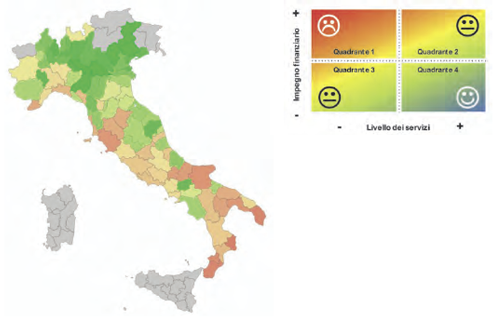QUALITY REGULATION IN THE WASTE SECTOR: ARERA INTERVENTION
Main Article Content
Abstract
The new EU measures on circular economy will force municipalities and waste management companies to improve and/or apply changes to the services they provide to accomplish their implementation while they are already called to provide increasingly efficient, effective, diffused and personalized services. Within the wider regulatory framework set up by the European and national institutions, ARERA – the Italian Regulatory Authority for Energy, Networks and Environment which carries out regulatory and supervisory activities in the sectors of electricity, natural gas, district heating, water services and the waste cycle - plays an important and innovative role, particularly for the waste management sector, which has been attributed to ARERA on 2018. In its Annual Report, 2019, ARERA describes the industry in this way: “The waste sector presents relevant differences when compared with the other sectors regulated by the Authority and is characterized by a high level of complexity and heterogeneity in its management, in addition to its governance. Over time the sector has transformed from a simple supply chain system, in which the protected interest was limited to urban hygiene, to a complex supply chain system, in which the objective of urban hygiene is joined by need to reduce the environmental impact and to replace landfill disposal with the recovery of materials and energy”. The Guidelines that ARERA will follow in its regulation activity seem to be clear and follow a well-known pattern that sees Tariffs, Quality of Service and Unbundling as key elements of its action. Authority, has started its regulation activity in waste management sector by defining tariffs for urban and related waste in accordance with the “polluter pays principle”: “Delibera 443/2019/R/RIF” is the resolution ARERA has adopted to manage the first tariff regulation period - lasting four years and divided into two half-periods. After tariffs, quality of services is the second issue approached by the Authority. It has started its activity gathering data from municipalities and companies and also in this case a first resolution has already been adopted: it is related to relation with customer, the so called “transparency” (TITR), a resolution regarding basic information to be provided to customers. More measures with the purpose of establishing how company-costumer relationships must be dealt with are expected to come soon. The quality regulation will also be extended to the so-called "technical quality" (e.g. in electricity sector it takes into consideration continuity standards, in the gas sector pays attention to continuity and safety standards and in the water sector to the system of technical quality indicators). In waste management, there are not specific provisions regarding to service levels for urban and related waste. National and regional laws only set out high level targets and guiding principles. It is particularly important to define service standards, in a market characterized by a very heterogeneous variety of performances and diversified operating models. In fact, in Italy, on the one hand, there are municipalities in which the quality of service is at levels comparable to those of the best European experiences or even better, on the other hand, there are many areas in which it is difficult to guaranty even minimum levels of hygiene. Taking into consideration well-known patterns and models ARERA will follow to develop quality regulation, based on what already experimented in other sectors such as energy or water service, municipalities and companies are already able to analyze their situation on the organizational and operating side to identify where improvements are needed and which investments must be planned (especially investments regarding digital transformation and data collection) to guarantee future regulatory compliance. Now it is still too early to assess whether the regulatory approach proposed by ARERA – just started with tariffs and “transparency” – will deliver hoped effects flawlessly. The path taken by ARERA, despite some undesirable effects could happen and its completion has yet to be accomplished, seems to be suitable to create adequate stability conditions for waste management sector in the coming years. More stability and more clarity of the regulatory structure are the necessary condition to facilitate the realization of new infrastructures and for a growing homogenization of the quality levels of service in Italy.

